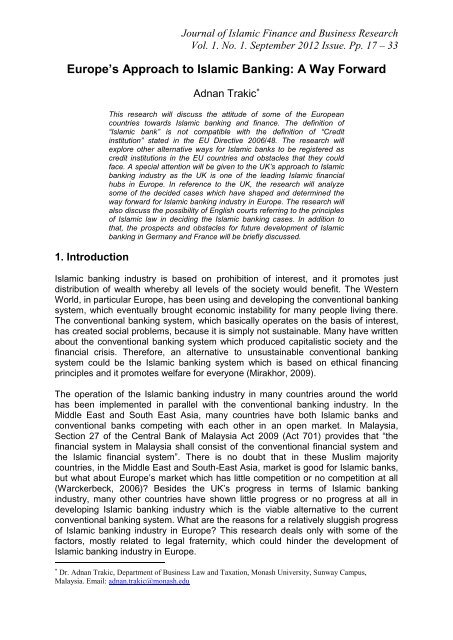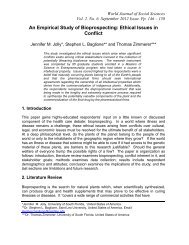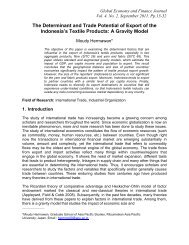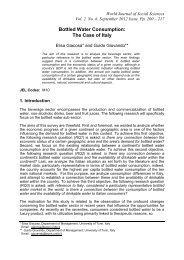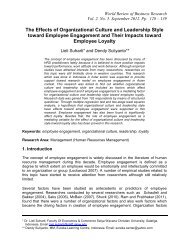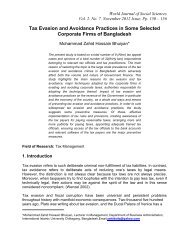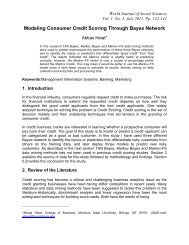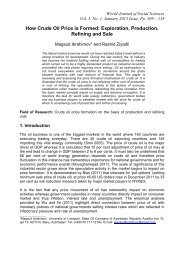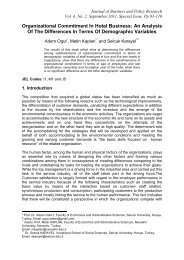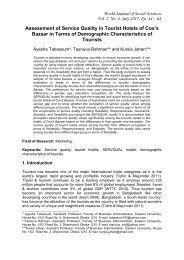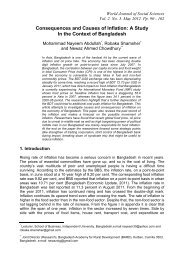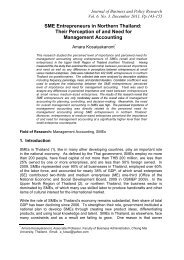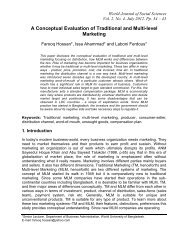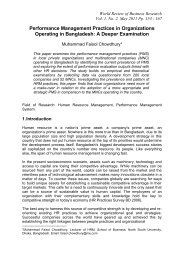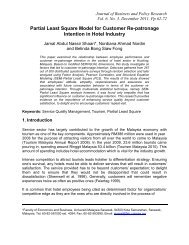Europe's Approach to Islamic Banking: A Way Forward - Wbiaus.org
Europe's Approach to Islamic Banking: A Way Forward - Wbiaus.org
Europe's Approach to Islamic Banking: A Way Forward - Wbiaus.org
You also want an ePaper? Increase the reach of your titles
YUMPU automatically turns print PDFs into web optimized ePapers that Google loves.
Journal of <strong>Islamic</strong> Finance and Business ResearchVol. 1. No. 1. September 2012 Issue. Pp. 17 – 33Europe’s <strong>Approach</strong> <strong>to</strong> <strong>Islamic</strong> <strong>Banking</strong>: A <strong>Way</strong> <strong>Forward</strong>1. IntroductionAdnan Trakic This research will discuss the attitude of some of the Europeancountries <strong>to</strong>wards <strong>Islamic</strong> banking and finance. The definition of“<strong>Islamic</strong> bank” is not compatible with the definition of “Creditinstitution” stated in the EU Directive 2006/48. The research willexplore other alternative ways for <strong>Islamic</strong> banks <strong>to</strong> be registered ascredit institutions in the EU countries and obstacles that they couldface. A special attention will be given <strong>to</strong> the UK’s approach <strong>to</strong> <strong>Islamic</strong>banking industry as the UK is one of the leading <strong>Islamic</strong> financialhubs in Europe. In reference <strong>to</strong> the UK, the research will analyzesome of the decided cases which have shaped and determined theway forward for <strong>Islamic</strong> banking industry in Europe. The research willalso discuss the possibility of English courts referring <strong>to</strong> the principlesof <strong>Islamic</strong> law in deciding the <strong>Islamic</strong> banking cases. In addition <strong>to</strong>that, the prospects and obstacles for future development of <strong>Islamic</strong>banking in Germany and France will be briefly discussed.<strong>Islamic</strong> banking industry is based on prohibition of interest, and it promotes justdistribution of wealth whereby all levels of the society would benefit. The WesternWorld, in particular Europe, has been using and developing the conventional bankingsystem, which eventually brought economic instability for many people living there.The conventional banking system, which basically operates on the basis of interest,has created social problems, because it is simply not sustainable. Many have writtenabout the conventional banking system which produced capitalistic society and thefinancial crisis. Therefore, an alternative <strong>to</strong> unsustainable conventional bankingsystem could be the <strong>Islamic</strong> banking system which is based on ethical financingprinciples and it promotes welfare for everyone (Mirakhor, 2009).The operation of the <strong>Islamic</strong> banking industry in many countries around the worldhas been implemented in parallel with the conventional banking industry. In theMiddle East and South East Asia, many countries have both <strong>Islamic</strong> banks andconventional banks competing with each other in an open market. In Malaysia,Section 27 of the Central Bank of Malaysia Act 2009 (Act 701) provides that “thefinancial system in Malaysia shall consist of the conventional financial system andthe <strong>Islamic</strong> financial system”. There is no doubt that in these Muslim majoritycountries, in the Middle East and South-East Asia, market is good for <strong>Islamic</strong> banks,but what about Europe’s market which has little competition or no competition at all(Warckerbeck, 2006)? Besides the UK’s progress in terms of <strong>Islamic</strong> bankingindustry, many other countries have shown little progress or no progress at all indeveloping <strong>Islamic</strong> banking industry which is the viable alternative <strong>to</strong> the currentconventional banking system. What are the reasons for a relatively sluggish progressof <strong>Islamic</strong> banking industry in Europe? This research deals only with some of thefac<strong>to</strong>rs, mostly related <strong>to</strong> legal fraternity, which could hinder the development of<strong>Islamic</strong> banking industry in Europe. Dr. Adnan Trakic, Department of Business Law and Taxation, Monash University, Sunway Campus,Malaysia. Email: adnan.trakic@monash.edu
TrakicThe main motivational fac<strong>to</strong>rs behind this study are the lack of appropriate legalframework for the incorporation and operation of the <strong>Islamic</strong> banks in Europe, as wellas the existence of the inadequate judicial settlement mechanism. In addition <strong>to</strong> this,Europe’s market for the <strong>Islamic</strong> banking industry remains largely unutilized due <strong>to</strong>many reasons, amongst which two are dominant, i.e. unsuitability of the EU’s legalregime for <strong>Islamic</strong> banks, as well as the lack of interest on part of <strong>Islamic</strong> banks fromthe Middle East and around the world <strong>to</strong> venture in<strong>to</strong> the EU market.The current EU legal banking framework, within which banks in the EU countriesoperate, is not suitable for <strong>Islamic</strong> banks as it only recognizes the operation of creditinstitutions which intrinsically do not include the <strong>Islamic</strong> banks. The <strong>Islamic</strong> banks donot confirm with the requirements of credit institutions. The research will explorewhether and how the <strong>Islamic</strong> banks could be accommodated in<strong>to</strong> the existing legalregime. Another impediment for the operation of <strong>Islamic</strong> banking throughout the EUcountries is the inadequate judicial settlement mechanism. Some of the landmarkjudicial decisions by the English courts will be constructively discussed andexamined.Furthermore, the research argues that the <strong>Islamic</strong> banking industry has a hugepotential throughout Europe. Kettani (2010) states that, as of 2010, the estimatedMuslim population in Europe is 42,052,753, which is 5.74% of the <strong>to</strong>tal Europe’spopulation. Many of them have higher income than those living in many Muslimcountries in the Middle East and South East Asia. These facts should be a greatindica<strong>to</strong>r that the potential for the <strong>Islamic</strong> banking industry in the EU countries istremendous. However, until now, only the United Kingdom (UK) has put a significanteffort in introducing the <strong>Islamic</strong> banking products. The other countries do practice<strong>Islamic</strong> banking but at a small scale compare <strong>to</strong> their potential. Therefore, this studywill try <strong>to</strong> highlight the tremendous opportunities for <strong>Islamic</strong> banks in the EU.2. Literature ReviewThe literature discussing about Europe’s approach <strong>to</strong> <strong>Islamic</strong> banking and challengesthat it faces could be perhaps clustered in<strong>to</strong> two main categories, i.e. literaturediscussing the feasibility of devising an appropriate legal framework in the EU ingeneral, and at the national level in particular, for incorporation and operation of<strong>Islamic</strong> banks as credit institutions (Khan and Porzio, 2010), (Abbadessa ,2010), and(Trakic, 2012), and literature discussing the unutilized potential that <strong>Islamic</strong> bankingindustry has in the Europe’s market (Wilson, 2007), Balz, 2007), and (Cowan, 1996).One of the preconditions for effective incorporation and operation of <strong>Islamic</strong> bankingis the installment of effective legal framework within which the <strong>Islamic</strong> banks wouldoperate. There is much literature discussing the general principles in relation <strong>to</strong> theestablishment of effective legal frameworks for the <strong>Islamic</strong> banking industryworldwide and in the context of different countries. Engku Rabiah (2008), HamidSultan (2009), and Sudin Haron and Wan Nursofiza (2009) have discussed theimportance of legislative interventions generally in order for <strong>Islamic</strong> banking andfinance <strong>to</strong> be implemented effectively. They have identified that there is a need at aglobal level for the countries interested <strong>to</strong> introduce or develop further <strong>Islamic</strong>banking and finance <strong>to</strong> legislate effective banking laws and <strong>to</strong> have adequate judicialprotection. However, it has <strong>to</strong> be kept in mind that these writers talked about18
Trakiclegislative interventions on the global level. They did not discuss the necessarylegislative interventions in a European context, in countries where non-<strong>Islamic</strong> legalsystems operate.Michael Silva (2006) and Ali Adnan Ibrahim (2008) put their emphasis on thecollaboration between theoretical frameworks with active intervention by thelegisla<strong>to</strong>rs in a particular country that wishes <strong>to</strong> develop <strong>Islamic</strong> banking. Thetheoretical framework of <strong>Islamic</strong> banking must never be neglected and set aside. Itshould be remembered that the origins of <strong>Islamic</strong> banking come from the basicsources of <strong>Islamic</strong> teaching, and therefore, the constant referral <strong>to</strong> the basicprinciples of the <strong>Islamic</strong> economics should be maintained.If the necessary legislative efforts are not made in developing an effective legal,regula<strong>to</strong>ry, and supervisory framework, the financial system of a country would beaffected (Zeti Akhtar Aziz, 2006). On the other hand, the establishment of theeffective legal framework should start from the people’s initiatives or demands(Karasik et al., 2007).In the UK, the fact that the Muslim community is comprised of about 1.5 millionBritish citizens and permanent residents and up <strong>to</strong> 500,000 temporary residents(students and visi<strong>to</strong>rs) has contributed tremendously <strong>to</strong>wards the development of the<strong>Islamic</strong> banking industry. It is true that numbers alone will not improve the situation,but the size of the Muslim community in a place like the UK, where they are activelydemanding <strong>Islamic</strong> banking services, can contribute <strong>to</strong>wards the development of the<strong>Islamic</strong> banking industry (Trakic, 2012). In the case of the UK the number of productsoffered <strong>to</strong> the Muslim community is quiet low and the community is demanding widerand richer product development by the banks offering <strong>Islamic</strong> banking.Furthermore, Iqbal (2010) opines that <strong>Islamic</strong> banking and finance is not restricted <strong>to</strong>Muslim countries, but its success depends on the Muslim community. Whereverthere is a considerably large Muslim community the need for <strong>Islamic</strong> banking andfinance will emerge and spread. However, this literature has only discussed therelationship between the <strong>Islamic</strong> banking and finance industry and the demand bythe community in a global context, with the exception of specific reference <strong>to</strong> the UK.None of them have explored and analyzed the predominant reasons for the sluggishdevelopment of <strong>Islamic</strong> banking and finance in some European countries wherethere are a significant number of Muslims.Wilson (2007), Balz (2007), and Cowan (1996) have stated that <strong>Islamic</strong> banking hasgreat potential in Europe, if legislative changes meet the demands of the <strong>Islamic</strong>banking industry. Wilson clearly states that if the UK wants <strong>to</strong> remain the main<strong>Islamic</strong> finance centre in Europe, it has <strong>to</strong> be more proactive in improving the existinglegal framework. Germany for example, despite the fact that German law providesfor religious freedom, as explained by Robbers (2001), still has some problems inrelation <strong>to</strong> this and it is understandable for a country with 82 million people.According <strong>to</strong> Balz, Germany and its society needs <strong>to</strong> move away from the traditionalphenomena known as ‘leitkultur’, and the attitude of the Muslim community also has<strong>to</strong> change. A substantial demand for <strong>Islamic</strong> banking products and services needs <strong>to</strong>be created. On the other hand, Cowan opines that France has recently showninterest in being actively engaged in <strong>Islamic</strong> banking and finance whereby it aims <strong>to</strong>attract investments from the Gulf and also <strong>to</strong> suit the needs of a large local Muslim19
Trakiccommunity. Furthermore, mutual co-operation between Muslim countries andEuropean countries is of common interest. Mannan (2002) has explained that theOrganization of <strong>Islamic</strong> Conference (OIC) countries should have joint economicaction in dealing with the European countries.When one talks about <strong>Islamic</strong> banking in the European context, one needs <strong>to</strong> explorethe political and communal attitude <strong>to</strong>wards Islam and Muslims in Europe and alsothe attitude of Muslims <strong>to</strong> being European Muslims or Muslim Minorities in the West.The jurisprudence of Muslim minorities has been discussed by Fishman (2006),whereby he stressed the importance of proper understanding of <strong>Islamic</strong>jurisprudence in relation <strong>to</strong> Muslim minorities and their successful integration,whereby they will prosper as a community and at the same time contribute <strong>to</strong> theprosperity of the countries in which they live. Nonetheless, Fishman only explainedabout the necessary integration of the Muslim minorities in<strong>to</strong> a European community,without mentioning the equally important need for the European communities <strong>to</strong>accept the Muslim minorities as equal citizens who contribute <strong>to</strong>wards the prosperityand development of those countries.3. The MethodologyThe paper is using a qualitative research methodology, whereby content analysisand case study have been used. The paper explores the existing legal framework inthe EU, in general, and the UK, in particular, <strong>to</strong> find out whether it is suitable for theeffective incorporation and operation of <strong>Islamic</strong> banks. In fact, the provisions of lawsare carefully analyzed in order <strong>to</strong> see whether the existing legal framework isaccommodative of <strong>Islamic</strong> banking or not. The research makes use of a case studywhereby the UK’s approach <strong>to</strong> <strong>Islamic</strong> banking is duly discussed with a view offinding a viable solution. The UK has been chosen because it is one of the leadingcountries in Europe and the rest of the Western world in <strong>Islamic</strong> banking and finance.The UK’s experience in dealing with the <strong>Islamic</strong> banking, arguably, is reflective ofother EU countries as the EU membership presumes a certain level of harmonizationof laws. Therefore, for instance, the UK’s conflict of laws rules in relation <strong>to</strong> crossbordercontracts adjudicated before the English courts are governed by the Rome IRegulation, European Parliament and Council Regulation No. 593/2008 of June 172008 on the Law Applicable <strong>to</strong> Contractual Obligations (Rome I), which is applicable<strong>to</strong> contracts concluded after December 2009. In addition, the paper will make use ofthe recent landmark judicial decisions in the UK which have shaped the futurepathway for the industry. The research will also <strong>to</strong>uch on German’s and Frenchexperience in accommodating <strong>Islamic</strong> banking.4. <strong>Islamic</strong> <strong>Banking</strong> and EU’s LegislationThe <strong>Islamic</strong> banking system can be, and is the alternative <strong>to</strong> the conventionalbanking system in Europe and elsewhere. Nevertheless, in order <strong>to</strong> achieve this aim,a lot of efforts need <strong>to</strong> be put in developing right <strong>Islamic</strong> banking products that are inthe first place, Shari’ah compliant, and secondly, in accordance with the EUlegislation.Generally, there are three types of institutions in the EU that have been allowed <strong>to</strong>operate in the market, and they are as follow:20
Trakic1. Credit institutions (banks)2. Investment firms3. Payment institutions4.1 Credit Institutions (Banks)Article 4 (1) (a)(b) of the EU Directive 2006/48EC 1 (European <strong>Banking</strong> Code) definesthe credit institutions stating that ”credit institution means (a) an undertaking whosebusiness is <strong>to</strong> receive deposits or other payable funds from the public and <strong>to</strong> grantcredits for its own account, or (b) an electronic money institution within the meaningof Directive 2000/46 EC”. 2 The credit institutions (banks) in the EU have an obligationor duty <strong>to</strong> pay the deposits deposited by the deposi<strong>to</strong>rs and they must guarantee therefunding of the deposits. Thus, the full risk of the investment of those funds is withthe banks and the deposi<strong>to</strong>rs are always guaranteed with the return of their deposits.Furthermore, for credit institutions (banks) <strong>to</strong> operate their business, they need <strong>to</strong>obtain an authorization from the national authority of the EU state in which they want<strong>to</strong> operate their business. The national authority of that particular state must beempowered by the national law <strong>to</strong> give such an authority. Article 6 of the Directive2006/46/ EC provides that “Member States shall require credit institutions <strong>to</strong> obtainauthorization before commencing their activities. Without prejudice <strong>to</strong> Articles 7 <strong>to</strong>12, they shall lay down the requirements for such authorization and notify them <strong>to</strong>the commission.” 3Therefore, if the credit institution fulfills all requirements the authorization must begiven accordingly. However, there are few situations where the national authority canreject granting the authorization based on article 12 of Directive 2006/46/EC.1. Article 12 (1) provides the following: “the competent authority shall not grantauthorization for the taking-up of the business of credit institutions unless theyhave been informed of the identities of the shareholders or members, whetherdirect or indirect, natural or legal persons, that have qualifying holdings, andof the amounts of those holdings.” 42. Furthermore Article 12 (2) states that “the competent authority shall not grantauthorization, if taking in<strong>to</strong> account the need <strong>to</strong> ensure the sound and prudentmanagement of a credit institution, they are not satisfied as <strong>to</strong> the stability ofthe shareholders or members. 53. Finally, Article 12 (3) explains that the competent authorities shall not grantthe authorization if the close links between credit institution and other naturallegal person prevent effective exercise of their supervisory by thoseauthorities. In addition, Article 12 (3) states the following words: “thecompetent authorities shall not grant authorization if the laws, regulations oradministrative provisions of a third country governing one or more natural orlegal persons with which the credit institutions have close links, or difficultiesinvolved in the enforcement of those laws, regulations or administrativeprovisions, prevent the effective exercise of their supervisory functions.” 6The credit institutions are required <strong>to</strong> provide all necessary information <strong>to</strong> thecompetent authorities on regular basis so that the competent authorities can makesure that they comply with all the necessary requirements according <strong>to</strong> Article 12 (3).21
Trakic4.2 Investment FirmsArticle 4 (1) of the Directive 2004/39/EC 7 defines an investment firm whereby it hasstates: “any legal person whose regular occupation or business is the provision ofone or more investment services <strong>to</strong> third parties and/or for the performance of one ormore investment activities on a professional basis.” 8 The investment firms, same asthe credit institutions, need <strong>to</strong> get the authorization from the relevant nationalauthority from the EU member state where the investment firm wants <strong>to</strong> do itsbusiness. Article 5 of Directive 2004/39/EC provides the following: “Each MemberState shall require that the performance of the investment services or activities asregular occupation or business on a professional basis be subject <strong>to</strong> priorauthorization in accordance with the provisions of this Chapter. Such authorizationshall be granted by the home Member State competent authority designated inaccordance with Article 48.” 9The competent national authority shall grant the authorization if all the necessaryrequirements have been fulfilled by the investment firm. Article 10 of Directive2004/39/EC deals with the situations where the authorization by the competentnational authority could be rejected. 10One of the unique features of the authorization of the credit institutions andinvestment firms by the competent national authority is the acquisition of the “EUpassport” status. This means that upon obtaining the authorization from thecompetent national authority, the credit institutions and investment firms are allowed<strong>to</strong> open their branches throughout the EU countries and <strong>to</strong> provide cross-borderservices, as long as they abide by the statu<strong>to</strong>ry rules of the state from which theyreceived the authorization.However, these above mentioned rules in the Directives are applicable in caseswhere the headquarters of the banks are in one of the EU member states. However,what would be the situation if the headquarters are somewhere else, for instance insome of the Muslim countries and the banks want <strong>to</strong> open a branch in one of the EUcountries. The EU Directives do not provide for this situation. However, the EUcountries are not allowed <strong>to</strong> discriminate between the domestic financial institutionsand those which are from other countries that are not within the EU. The EuropeanCommission definitely will impose very particular conditions in conducting somearrangements with those foreign institutions. Those foreign financial institutions maybe allowed <strong>to</strong> operate through the financial intermediaries. One of the basic aims ofthe European Commission in having this close moni<strong>to</strong>ring of the authorizationprocess in these situations is <strong>to</strong> keep the financial stability throughout the EUcountries at certain desirable level.4.3 Payment InstitutionsPayment institutions are somehow intermediaries between the banks and investmentfirms. Article 4(4) of the Directive 2007/64/EC asserts that “payment institutionmeans a legal person that has been granted authorization in accordance with article10 <strong>to</strong> provide and execute payment services throughout the Community.” 11 However,the credit institutions (banks) are in the best position since they are able <strong>to</strong> performpayments and investments under the same regulations.22
Trakic4.4 <strong>Islamic</strong> banks vis-à-vis Credit InstitutionsAfter the above explanation about the financial institutions which are allowed <strong>to</strong>operate in Europe, one may not but wonder, whether <strong>Islamic</strong> bank could be regardedas credit institution under the EU Directives? It is clear that the definition of a creditinstitution given in Article 4 (1)(a) of the Directive 2006/48/EC (which explains thatthe credit institutions are undertaking which collect the deposits from the publicwhereby the return of the deposits is guaranteed and grant the credit whereby theinterest is dominant element) does not accommodate <strong>Islamic</strong> banks because both ofthe activities of credit institutions are not within the lawful scope of <strong>Islamic</strong> banks.Therefore, <strong>Islamic</strong> banks, generally speaking, do not fall within the definition of creditinstitutions according <strong>to</strong> the EU Directives (Khan and Porzio, 2010).Having said the above, the definition of a ‘bank’ could differ from one EU country <strong>to</strong>another. For example, Abbadessa (2010) 12 argues that the contention that the<strong>Islamic</strong> bank does not qualify <strong>to</strong> the definition of ‘bank’, according <strong>to</strong> Italian law, isdifficult <strong>to</strong> disagree. He contends that the <strong>Islamic</strong> banks do not do banking businesswhich banks in Italy do, such as collecting of the deposits from the public with theguaranteed return and granting of credit. It is essential for these two conditions <strong>to</strong> befulfilled in order for the institution <strong>to</strong> become a bank. However, Consolidated Law on<strong>Banking</strong> in Italy allows banks <strong>to</strong> operate other additional financial activities which<strong>Islamic</strong> banks could competitively do. According <strong>to</strong> Abbadessa (2010), despite thefact that the financial activities are allowed, Article 10 paragraph 3 of theConsolidated Law on <strong>Banking</strong> clearly provides that the two preliminary conditionsmust be fulfilled in order for the institution <strong>to</strong> be called a bank. Therefore, in thesituations like in Italy, there should be a solution found for the <strong>Islamic</strong> banks either byway of having the two first requirements just formally mentioned in the corporateobjects and programs, while in practice the <strong>Islamic</strong> banks should be given the rightnot <strong>to</strong> follow them, or by creating some express legislative provisions allowing the<strong>Islamic</strong> banks <strong>to</strong> operate if the two preliminary conditions are not fulfilled. Currently,as mentioned by Abbadesssa (2010), these exceptions are not allowed in Italy sincethe “financial activities” comes as addition <strong>to</strong> the “banking activities”.Another aspect which differentiates <strong>Islamic</strong> banks from credit institutions is theunderlying structure of the products they offer. One of the underlying concepts basedon which the <strong>Islamic</strong> banking products are developed is trading. The trading isexpressly allowed in Islam while the interest is prohibited. 13 At the same time, thechallenge in developing new <strong>Islamic</strong> banking products is <strong>to</strong> make them inaccordance with the existing law of that particular country, or in this present case theEU. One of the widely spread <strong>Islamic</strong> banking products is murabahah financingwhich, in order <strong>to</strong> be practiced in Europe in its well accepted form, needs <strong>to</strong> beadjusted <strong>to</strong> be in accordance with the EU legislation.Murabahah financing is based on trading agreements, i.e. Property PurchaseAgreement (PPA) whereby the bank purchases the property which has beeninspected and chosen by the cus<strong>to</strong>mer and then sells it back <strong>to</strong> the cus<strong>to</strong>mer at themark-up price through Property Sale Agreement (PSA) (Sudin Haron and WanNursofiza, 2009). This product for example does not completely comply with the EUlaw and its application in the EU countries could raise some legal issues. Thequestionable practice of murabahah is the part where the bank upon selling of theproperty, for instance a car, <strong>to</strong> the cus<strong>to</strong>mer is not willing <strong>to</strong> take warranty in case of23
Trakicany defects <strong>to</strong> the property and the bank usually assigns the warranty clause <strong>to</strong> thecus<strong>to</strong>mer (Balz, 2007). This practice of murabahah financing contradicts the EUDirective 1999/44/EC of the European Parliament and of the Council of 25 May 1999on certain aspects of the sale of consumer goods and associated guarantees. 14 TheDirective provides that seller must give warranty <strong>to</strong> the buyer if the property that isbeing sold is a new property. Basically, the EU laws and regulations are in fact veryprotective of consumers.Article 1 of the EU Directive 1999/44/EC provides the following: “the purpose of thisDirective is the approximation of the laws, regulations and administrative provisionsof the Member States on certain aspects of sale of consumer goods and associatedguarantees in order <strong>to</strong> ensure a uniform minimum level of consumer protection in thecontext of international market. 15 Furthermore, Article 3(1) of the Directive states:“the seller shall be liable <strong>to</strong> the consumer for any lack of conformity which exists atthe time the goods were delivered.” 16 Therefore, the EU Directive 1999/44/EC doesnot prohibit the concept of the murabahah financing, but it rather requires it <strong>to</strong> bereshaped <strong>to</strong> suit the EU minimum standards of protection for the consumers.In some other jurisdictions like in Malaysia, for instance, the <strong>Islamic</strong> banks areusually not considered as seller of goods but rather financier or intermediary. 17 Thiscould be one of the possible arguments which could be used by the <strong>Islamic</strong> banks inEurope <strong>to</strong> avoid the obligations imposed by the EU Directive 1999/44/EC on theseller of consumer goods and associated guarantees. Although the general view isthat the <strong>Islamic</strong> banks are regarded as financial intermediaries, there might be asituation where <strong>Islamic</strong> banks need <strong>to</strong> deviate from being an intermediary. The bestexample is the case of leasing and leasing-based financing (Seif I. Tag El-Din and N.Irwani Abdullah, 2007). Before the bank is allowed <strong>to</strong> lease the property it mustpurchase the property and acquire the ownership. In Malaysia, in most of the casesthe bank will acquire beneficial ownership while the legal title would be on thecus<strong>to</strong>mer (Fakihah, 2009). The ownership naturally assumes the rights, liabilities andrisks associated with the property. In fact, the ownership defies the <strong>Islamic</strong> bank’sbasic position as a mere financial intermediary. Therefore, the claim that the <strong>Islamic</strong>bank is a mere intermediary is difficult <strong>to</strong> sustain as the <strong>Islamic</strong> banks are activelyinvolved in the financing facility and are undertaking the associated risks.5. <strong>Islamic</strong> <strong>Banking</strong> - UK’s ExperienceThe UK has long dated tradition of dealing with the financial matters in a verysuccessful manner. Therefore, it is not surprising that London is still world leadingfinancial centre (Davis, 2009). The rapid growth of the <strong>Islamic</strong> banking and financewas not neglected by the UK. In fact, the Shari’ah compliant assets in the UK are$19 bn, which puts the UK in 8 th position in the world (International FinancialServices London, 2010). The reasons for the success of <strong>Islamic</strong> finance industry inthe UK are:1. Supportive government policies;2. Proactive role of the UK’s enterprising private sec<strong>to</strong>r, and3. Strong demand from the UK’s Muslim population for Shari’ah compliantbanking products.24
TrakicThe International Financial Services London in their January 2010 report entitled“<strong>Islamic</strong> Finance 2010” mentioned the following <strong>Islamic</strong> finance accomplishments inthe UK are:- 22 bank offering <strong>Islamic</strong> finance among which 5 are fully Shari’ah compliantand two <strong>Islamic</strong> banks have been given license in 2008;- 20 sukuk issues raising $11bn listed on London S<strong>to</strong>ck Exchange which hasbeen only exceeded by Dubai Nasdaq;- 7 Shari’ah Compliant exchange-traded funds (ETFs);- 20 law firms that provide services in relation <strong>to</strong> <strong>Islamic</strong> finance;- Advisory services being provided by the Big Four professional service firms;- Institutions that offer educational and training products in the <strong>Islamic</strong> finance;- Off-exchange trading in commodity-based agreements linked <strong>to</strong> LMEcontracts. (International Financial Services London, 2010)The <strong>Islamic</strong> Bank of Britain (IBB) is the first standalone fully Shari’ah compliant<strong>Islamic</strong> bank in the UK which was established in September 2004. It was followed byfour other fully Shari’ah compliant banks which were established in period between2006 and 2008, and those banks are: The European Investment <strong>Islamic</strong> Bank (EIIB),The Bank of London and Middle East (BLME), European Finance House, andGatehouse Bank. 17 conventional banks offer the <strong>Islamic</strong> finance products throughtheir <strong>Islamic</strong> Windows (International Financial Services London (IFSL), 2010).5.1 Regula<strong>to</strong>ry Framework for <strong>Islamic</strong> <strong>Banking</strong> in the UKIt has been quite often contended that the UK is a country which could serve as agood example for well <strong>org</strong>anized and established regula<strong>to</strong>ry framework within whichthe <strong>Islamic</strong> banking industry operates in the Western context. It is important <strong>to</strong> clearlymention that the UK does not have any specific legislation regulating the <strong>Islamic</strong>banking activities per se, but rather the operation of the <strong>Islamic</strong> banking is donewithin the existing legal framework within which the conventional banks operate aswell. Thus, the <strong>Islamic</strong> banks are regarded as banks and governed by the same lawsas the conventional banks. In fact, the UK’s Government policy is not <strong>to</strong> discriminate<strong>Islamic</strong> banks from the conventional banks, and the idea was <strong>to</strong> make them equallyregulated at the same level with healthy competition.The legislative framework for the <strong>Islamic</strong> banking industry in the UK in its currentstate came in<strong>to</strong> existence due <strong>to</strong> the hard work and effort by UK’s Government, FSA,Bank of England and some other institutions. One institution which contributed atlarge scale <strong>to</strong> its development is the UK’s single financial regula<strong>to</strong>r FSA. 18The main barriers for the development of the <strong>Islamic</strong> banking and finance in the UKthat have been mentioned by the HM Treasury Report December 2008 are; taxationand regulation, standardization, awareness, and skills. 19 In order <strong>to</strong> facilitate theissues in relation <strong>to</strong> the taxation that arose in the UK with the implementation of the<strong>Islamic</strong> banking and finance, in 2003, the HM Treasury and HM Revenue & Cus<strong>to</strong>msTax Technical Working Group was established. Few legislative changes have beenintroduced <strong>to</strong> the Finance Act in 2003, 2005, and 2006. The amendments <strong>to</strong> the taxlegislation were made where legislation uses the term “alternative financearrangements” rather than <strong>Islamic</strong> finance. It is important <strong>to</strong> know that the UK’changes <strong>to</strong> the tax law have nothing <strong>to</strong> do with the Shari’ah law, and are particularly25
Trakicnot made with the feeling of need <strong>to</strong> comply with the Shari’ah. The changes <strong>to</strong> theUK tax law were made <strong>to</strong> suit everybody, regardless of which religion, and thesubject matter of the discussion when analyzing these changes falls within the taxlaw and not Shari’ah interpretation of it (Amin, 2007).Furthermore, it is very important <strong>to</strong> understand the proper meaning and the scope ofthe “alternative finance arrangements”. Alternative finance arrangements are thearrangements which fall within four provisions, two among which give rise <strong>to</strong>alternative finance return, and the other two give rise <strong>to</strong> profit share return.Alternative finance return is related <strong>to</strong> purchase and resale as defined in section 47Finance Act 2005 (murabahah transaction), and diminishing share ownership asdefined in section 47A of the Finance Act 2005 (diminishing musharakah). Profitshare return is related <strong>to</strong> a deposit transaction as defined in section 49 of theFinance Act 2005 (mudharabah concept), and a profit share agency transaction asdefined in section 49A of the Finance Act 2005 (wakalah concept). 20The first change <strong>to</strong> the tax legislation which is relevant for the <strong>Islamic</strong> financeindustry is made <strong>to</strong> the Finance Act 2003 regarding the stamp duty land tax(SDLT). 21 The new amendment <strong>to</strong> the Finance Act 2003 effectively removed thedouble SDLT for the persons using the alternative property financing arrangementswhich cover the <strong>Islamic</strong> mortgages. Section 73, part IV of the Finance Act 2003clearly provides for the exemption of double SDLT in the above mentioned case. 22Later on the SLDT provisions were also extended <strong>to</strong> equity sharing in 2005 and also<strong>to</strong> companies in 2006.The legislative changes were also made in the Finance Act2005 and Finance Act 2006 in relation <strong>to</strong> tax whereby the two types of borrowingarrangements, as well as two types of depositing arrangements were introduced. 235.2 Judicial <strong>Approach</strong> <strong>to</strong>wards the <strong>Islamic</strong> <strong>Banking</strong> Cases in the UK1. <strong>Islamic</strong> Investment Company of the Gulf (Bahamas) Ltd v Symphony Gemsand others [2002] WL 346969 (Queens’s Bench Division, Commercial Court, 13February 2002).In this case the claimant, <strong>Islamic</strong> Investment Company of the Gulf (IICG), made aclaim against three defendants. First defendant was Symphony Gems NV(Symphony) and two other defendants were guaran<strong>to</strong>rs <strong>to</strong> the first defendant. Theparties entered in<strong>to</strong> a murabahah financing agreement on 27 th January 2000. IICGwas described in the agreement as a seller, while Symphony was a buyer. Basically,IICG was requested by Symphony <strong>to</strong> enter in<strong>to</strong> an agreement called murabahahfinancing whereby IICG would buy precious s<strong>to</strong>nes and gems from the supplier forUS$ 15 million and then sell it <strong>to</strong> Symphony by way of installments as agreed by theparties for US$ 15,834,900. There were several issues raised before the court. Oneof the issues raised is in relation <strong>to</strong> the governing law clause and governingjurisdiction clause.The case was decided by the High Court judge Tomlinson J. According <strong>to</strong> the court,the parties have expressly chosen the English court as a proper avenue <strong>to</strong> decidetheir disputes and that matters will be governed by the English court. Since theparties agreed that the contract concluded between them is a murabahah financingagreement, the logical sequence would be that the principles of the murabahahagreement would be enforced and followed as <strong>Islamic</strong> law stipulates. In fact, the26
Trakiccourt called two expert witnesses in order <strong>to</strong> learn more relevant information aboutthe murabahah agreement. Nevertheless, the expert opinion given by the expertwitness has not been taken in<strong>to</strong> consideration by the learned judge. Tomlinson Jstated:”The fact is that, as Dr Samaan states and as I have no reason <strong>to</strong> think is inany way inaccurate, this contract does not have the essential characteristics of aMorabaha contract. Furthermore, it is a contract governed by English law. I mustsimply construe it according <strong>to</strong> its terms as an English law contract”.The judgment was duly commented upon and criticized by a few Muslim scholars.For example, Norhashimah (2007, p. 104) questioned why the court called the expertwitnesses <strong>to</strong> give their opinion if their evidence “has no bearing whatsoever”?According <strong>to</strong> Engku Rabiah (2008), this case is an example where despite the factthat the transaction was not Shari’ah compliant, the English court said that it is validaccording <strong>to</strong> English law. This defeats the basic aim of the Shari’ah. Furthermore,she explains that this irregularity was made worse by the parties’ choice of law andchoice of court. In fact, the parties agreed that a non-<strong>Islamic</strong> court shall adjudicatethe matters in case of dispute in a non-<strong>Islamic</strong> jurisdiction.This case is an example which shows that having the contracts concluded betweenthe parties in accordance with <strong>Islamic</strong> law is not just enough. The subsequentenforcement or adjudication in case of dispute between the parties <strong>to</strong> the contract isessential. This is the additional challenge in countries where the <strong>Islamic</strong> law is notapplicable and where the courts are non-<strong>Islamic</strong> courts. Therefore, there is a need <strong>to</strong>deploy an effective mechanism which would enable the courts <strong>to</strong> follow thecontractual terms and <strong>Islamic</strong> nature of the contract where it is the case. The laws inthe non-<strong>Islamic</strong> countries which wish <strong>to</strong> introduce and practice <strong>Islamic</strong> banking andfinance could be duly amended <strong>to</strong> a certain extent so that the courts can recognizethe basic principles of <strong>Islamic</strong> law in relation <strong>to</strong> the contract. The above decision bythe English court defeats the object and purpose of having <strong>Islamic</strong> banking andfinance.2. Shamil Bank of Bahrain EC v Beximco Pharmaceuticals Ltd & Ors. [2004] 4All ER 1072This is another case where the parties entered in<strong>to</strong> murabahah agreement. Whenone of the parties defaulted the issues raised before the English Court of Appeal wasin relation <strong>to</strong> the governing law clause. However, the unique feature of this case isthat the parties <strong>to</strong> the murabahah agreements agreed in their governing clause thatthe contracts shall be governed by the English law subject <strong>to</strong> its consistency with theShari’ah. The governing clause of the murabahah agreements provided the followingclause: “Subject <strong>to</strong> the principles of the Glorious Shari’ah, the agreements should begoverned and construed in accordance with English law”. The contention put forwardby the Beximco was that the murabahah agreements were not in compliance withShari’ah principles and as such they should be declared invalid and unenforceable.The Court of Appeal judge Potter LJ rejected that contention and held that thecontracts are governed by the English law and not Shari’ah. Furthermore heexplained that the contracts cannot be governed by two set of laws or legal systemsat the same time. Nevertheless, the learned judge acknowledged the fact that theparties do have freedom <strong>to</strong> incorporate the provisions of the foreign law in<strong>to</strong> theircontracts through the ‘doctrine of incorporation’ and those foreign provisions would27
Trakicbe enforceable as the contractual terms. In order <strong>to</strong> do that, the contracting partiesmust identify clear ‘black letter’ provisions of the foreign law and not the foreign lawas a whole.3. The Investment Dar Company KSCC v Blom Developments Bank SAL [2009]EWHC 3545 (Ch)The master agreement in question was wakalah agreement and the contract wassupposed <strong>to</strong> be governed by the English law. In this case summary judgment wasgranted by the initial court in favor of the claimant bank referred hereafter as “Blom”.The amount of their claim that was granted was US$ 10,733,292,55. Nevertheless,the appeal was brought by the defendant hereafter referred as “TID” before the HighCourt, Chancery Division. Afterwards, TID experienced some financial difficulties anddefaulted in payment of principal amount plus agreed profits <strong>to</strong> Blom. The defenseraised by TID was that the wakalah facility was not Shari’ah compliant as it amounts<strong>to</strong> deposit taking with interest despite the fact that their internal Shari’ah Committeeapproved the facility as Shari’ah compliant. In addition, TID claimed that since thewakalah facility is not Shari’ah compliant it should be proclaimed as null and void asit amounts <strong>to</strong> ultra vires transaction for which the company has no authority <strong>to</strong>approve.The learned judge, Purle QC, of the High Court, Chancery Division observed that thegoverning law shall be the English law and the Court rejected <strong>to</strong> consider whetherfacility is Shari’ah compliant or not as TID had an internal Shari’ah Committeeentrusted <strong>to</strong> do that. Thus, the wakalah agreement was held <strong>to</strong> be valid andenforceable.This case has been subject of much criticism, not because of the way it has beendecided but rather because of how far the parties dealing with the <strong>Islamic</strong> financefacilities are ready <strong>to</strong> go <strong>to</strong> protect their own interest (Hakimah Yaakob, 2011). Thereare few points that could be raised.Firstly, the ethical component of business needs <strong>to</strong> be incorporated in<strong>to</strong> the cultureamong the players dealing with the <strong>Islamic</strong> finance facilities. The prefix <strong>Islamic</strong>facility in itself implies a huge responsibility on the party that operates <strong>Islamic</strong>financial business. The companies offering <strong>Islamic</strong> finance products should ensurethat the products offered by them are genuinely <strong>Islamic</strong>. That is why the <strong>Islamic</strong>financial institutions around the world have their independent, internal Shari’ahCommittee <strong>to</strong> ensure that the products offered by the institution are Shari’ahcompliant. Those <strong>Islamic</strong> financial institutions should not put forward in their defensean argument that the facility in question is not Shari’ah compliant and as such thetransaction is null and void. It is their duty <strong>to</strong> ensure that the facility is Shari’ahcompliant before they offer the facility <strong>to</strong> their cus<strong>to</strong>mers.Secondly, some financial institutions by invoking Shari’ah non-compliance of theirfacility as their defense argue that the transaction is void and unenforceable due <strong>to</strong>ultra vires nature of the transaction. In other words, the <strong>Islamic</strong> financial institutionhas no power <strong>to</strong> ratify those types of transactions. The old Common law position wasthat ultra vires transactions are rendered as void and the company cannotsubsequently ratify those transactions. 24 However, this law has been changed inmany jurisdictions, including the UK and Malaysia. 25 In Malaysia, for instance,28
Trakicsection 20 of the Companies Act 1968 governs the application of ultra vires doctrineand it clearly provides that the incapacity of company <strong>to</strong> do certain acts shall notinvalidate the transactions, but it can be used by the members of the company <strong>to</strong>initiate proceeding against the company or by the members and the company <strong>to</strong>initiate proceedings against present or former officer of the company. 26Lastly, the reluctance on the part of the <strong>Islamic</strong> financial institutions <strong>to</strong> accept theirfailure and <strong>to</strong> argue that the <strong>Islamic</strong> financial facility offered by them is not Shari’ahcompliant and as such should be null and void would damage their reputation in theeyes of the public and potential cus<strong>to</strong>mers. At the same time, it could have anadverse effect on <strong>Islamic</strong> finance industry in general. The <strong>Islamic</strong> finance institutionsmust ensure that the products offered by them are genuinely <strong>Islamic</strong> otherwise theyrisk losing the cus<strong>to</strong>mers. If the cus<strong>to</strong>mers do not see the substantial differencebetween the facilities offered by the <strong>Islamic</strong> financial institutions and the ones offeredby the conventional counterpart then they may chose <strong>to</strong> go with the conventionalones. The <strong>Islamic</strong> financial institutions should be ensuring their cus<strong>to</strong>mers of the true<strong>Islamic</strong> nature of their products and not claiming otherwise. However, in order forthem <strong>to</strong> be able <strong>to</strong> do that effectively, they themselves need <strong>to</strong> be convinced that the<strong>Islamic</strong> banking facility is Shari’ah compliant.6. A Brief Account of <strong>Islamic</strong> <strong>Banking</strong> and Finance in Germany andFranceGermany, despite having a significant number of Muslims, is far behind the UK inimplementation and development of <strong>Islamic</strong> banking and finance. The reasons forslow development of <strong>Islamic</strong> banking and finance in Germany are various but themain are two, according <strong>to</strong> Balz (2007), the existence of ‘leitkultur phenomena’ 27 inGerman society, and ‘fatwas’ 28 issued by some of the Muslim scholars whichexempt Muslims in Europe from application of certain Shari’ah principles on themwhich would in ordinary course of events be applicable on them.Balz (2007) respectfully disagrees with the contention that <strong>Islamic</strong> banking andfinance should not be allowed <strong>to</strong> be spread and developed in Germany. He listsdown few reasons why <strong>Islamic</strong> banking and finance should be allowed <strong>to</strong> develop inGermany, namely:1. It is not appropriate for financial regula<strong>to</strong>rs <strong>to</strong> decide and rule on issues aboutriba and its permissibility, in certain circumstances for Muslim communities inEurope, so that they can justify their unwillingness <strong>to</strong> allow <strong>Islamic</strong> bankingand finance <strong>to</strong> develop.2. From business point of view, <strong>Islamic</strong> banking and finance should be allowed<strong>to</strong> develop since Germany has a tremendous potential <strong>to</strong> expand and developits retail market because of huge Muslim population.3. <strong>Islamic</strong> banking and finance represents the niche market which needs <strong>to</strong> bedeveloped <strong>to</strong> suit the needs of consumers.4. There is unquestionable need for ethical finance in European context.5. From policy perspective, German Government should allow its Muslimcitizens <strong>to</strong> enjoy <strong>Islamic</strong> finance, and they should not be deprived of it justbecause of their faith (Balz, 2007).29
TrakicFurthermore, Al-Mogaddedi (2008), president of <strong>Islamic</strong> <strong>Banking</strong> and FinanceInstitute in Frankfurt, is of the view that Germany has tremendous potential fordevelopment of <strong>Islamic</strong> banking and finance, but the obvious obstacle is the presentGerman legal and financial system which is not yet ready <strong>to</strong> accommodate <strong>Islamic</strong>finance. He further states that German banks have been engaged in <strong>Islamic</strong> bankingand finance but predominantly outside Germany. The best examples are DeutscheBank that has been issuing “sukuk” <strong>to</strong>gether with Saudi Arabian banks since 2005 orDresdner Kleinwort which is subsidiary of Dresdner Bank, operated in Bahrain in2007.France is the European country which hosts the biggest Muslim population inEurope, of approximately 5 million. Unfortunately, the <strong>Islamic</strong> banking and financehas simply been left out from the agenda. Some of the <strong>Islamic</strong> bankers are of theview that one of the reasons for very poor initiative for development of <strong>Islamic</strong>banking products by Muslim population in France is that majority of the Muslimpopulation represents working class whose basic banking needs are satisfied byconventional French banks. On the other hand, some scholars are of the opinion thatthe main obstacle for the introduction and development of <strong>Islamic</strong> finance in Europeis the constant reluctance by the central bank, Banque de France, <strong>to</strong> issue licenses<strong>to</strong> <strong>Islamic</strong> banks since they operate their banking business on the different basisfrom their conventional counterparts (Cowan, 1996).Nevertheless, recently the French government changed its attitude about <strong>Islamic</strong>banking and finance due <strong>to</strong> the fact that <strong>Islamic</strong> banks have been left out almostun<strong>to</strong>uched by the global financial crisis. Another reason that has driven France<strong>to</strong>wards <strong>Islamic</strong> banking and finance is their wish <strong>to</strong> attract foreign investments. Inother words, France wants <strong>to</strong> become the European hub for <strong>Islamic</strong> banking andfinance for two reasons, namely <strong>to</strong> suit the needs of large local Muslim populationand <strong>to</strong> attract the big inves<strong>to</strong>rs from Gulf countries. The then French FinanceMinister Christine Lagarde (now Head of International Monetary Fund) has openlydeclared that Paris has a huge potential for <strong>Islamic</strong> banking and finance and not onlyLondon. In line with that the French parliament has already approved certainadjustments <strong>to</strong> banking laws in order <strong>to</strong> allow the competitive development of <strong>Islamic</strong>banking and finance. This of course did not pass without strong criticism from somepoliticians who are accusing the French government of introducing <strong>Islamic</strong> law in<strong>to</strong>their own French legal system. However, those are certain minority views and<strong>Islamic</strong> banking and finance is paving its way ahead in France. In light of that,<strong>Islamic</strong> Bank of Qatar is the first bank that has applied for license <strong>to</strong> operate <strong>Islamic</strong>banking and finance in France.7. ConclusionThe current EU legal regime is not suitable for the incorporation and operation of<strong>Islamic</strong> banks. A credit institution, by virtue of its definition under the EU Directive2006/48/EC (European <strong>Banking</strong> Code), cannot accommodate the definition of<strong>Islamic</strong> bank. The national laws of many EU countries are not <strong>Islamic</strong> bankingfriendly. The legisla<strong>to</strong>rs, at both EU and national level, should amend the laws <strong>to</strong> suitthe needs of <strong>Islamic</strong> banks, or at least, they could make some concessions for the<strong>Islamic</strong> banks. A successful example, where the legisla<strong>to</strong>rs at the national level didmake some legislative amendments <strong>to</strong> place <strong>Islamic</strong> banking industry at the level30
Trakicplaying field with the conventional counterpart, is the UK. Although, the UK is theleading <strong>Islamic</strong> finance country in the West, it still has long way <strong>to</strong> go for the industry<strong>to</strong> be fully competitive with the conventional counterpart, especially in the area ofdispute settlement mechanism. The decided judicial decisions indicated that theUK’s courts would only apply the English law and not Shari’ah in deciding the cases.One of the ways <strong>to</strong> overcome the obstacle of not having the Shari’ah aspect of acontract recognized and enforced by the UK courts in particular, and secular courtsin general, is <strong>to</strong> incorporate specific and clearly identified ‘black letter’ provisions ofthe Shari’ah in<strong>to</strong> a contract, and they would be enforced as contractual terms.Besides the UK, the rest of the Europe’s market remains largely untapped. Althoughthere is evidence that some EU countries are showing a considerate interest in theindustry, such as Germany and France, still their efforts are at small scale compare<strong>to</strong> their potential.Endnotes1 See Directive 2006/48/EC of the European Parliament and of the Council of 14 June 2006 relating <strong>to</strong>the taking up and pursuit of the business of credit institutions, Official Journal of the European Union,L177/12, 30.6.2006. Available at http://eur-lex.europa.eu.2 See Article 4 (1)(a)(b) of the Directive 2006/48/EC.3 See Article 6 of the Directive 2006/48/EC.4 See Article 12 (1) of the Directive 2006/48/EC.5 See Article 12 (2) of the Directive 2006/48/EC.6 See Article 12 (3) of the Directive 2006/48/EC.7 See Directive 2004/39/EC of the European Parliament and of the Council of 21 April 2004 onmarkets in financial instruments amending Council Directives 85/611/EEC and 93/6/EEC andDirective 2000/12/EC of the European Parliament and of the Council and repealing Council Directive93/22/EEC, Official Journal of the European Union, L145/1, 30.4.2004. Available at http://eurlex.europa.eu.8 See Article 4, section 1 (1) (a)(b) of the Directive 2004/39/EC.9 See Article 5 of the Directive 2004/39/EC.10 For detailed information see Article 10 of the Directive 2004/39/EC.11 See Article 4 (4) of the Directive 2007/64/EC.12 Pietro Abbadessa, ‘Cat<strong>to</strong>lica del Sacro Cuore, University of Milan, Italy.13 See Qur’an, Surah Al Baqarah: 275.14 See EU Directive 1999/44/EC of the European Parliament and of the Council of 25 May 1999 oncertain aspects of the sale of consumer goods and associated guarantees, Official Journal of theEuropean Communities, L 171/12, 7.7.1999. English edition. Available at http://eurlex.europa.eu/Result.do?T1=V3&T2=1999&T3=44&RechType=RECH_naturel&Submit=Search.Retrieved on 6 th August 2010.15 See Article 1 of the EU Directive 1999/44/EC.16 See Article 3 (1) of the EU Directive 1999/44/EC.17 For further details see Malaysia’s Sale of Goods Act 1957 (Act 382).18 The official website of the Financial Services Authority (FSA) is http://www.fsa.gov.uk .19 Ibid, at p. 15.20 Ibid. Also see sections 47, 47A, and 49, 49A of the Finance Act 2005.21 See Finance Act 2003, 2003 Chapter 14, 10 th July 2003. Available at http://www.legislation.gov.uk .22 See Section 73, part IV of the Finance Act 2003.23 For further details see Finance Act 2005, 7 th April 2005, and Finance Act 2006, 19 th July 2006.Available at http://www.legislation.gov.uk .24 See Ashbury Railway Carriage and Iron Company Ltd v. Riche (1875) LR 7 HL 653.25 For the UK’s approach, see Section 31 and 39 of the Companies Act 2006.26 See Section 20 (1)(2)(3) of the Companies Act 1968 (Act 125).27 “Leitkultur phenomena” the meaning of which is not unanimously determined, however, it coulddenote the need of the minorities living in certain countries <strong>to</strong> make integrative efforts so as <strong>to</strong>accommodate with the existing majority culture. Dr. Kilian Balz in the above mentioned article31
Trakicexplains that this concept is similar <strong>to</strong> the ideas put forward by Samuel Hunting<strong>to</strong>n, “Who Are We?:The Challenges <strong>to</strong> Americas National Identity (Simon & Schuster 2004) in the American context.28 There are few ‘fatwas’ or rulings made by some European Muslim scholars who in their liberalinterpretation of riba or interest in context of (Dar al Islam vis-à-vis Dar al Harb), stating that sinceEurope is regarded as Dar al Harb on non-Muslim terri<strong>to</strong>ry, certain types of riba in conventionalbanking transactions are allowed for Muslims living in those countries. However, it has <strong>to</strong> be notedthat this is the view of minority of Muslims scholars that has been strongly disputed by somerenowned Muslim scholars.ReferencesAbbadessa, P 2010, ‘<strong>Islamic</strong> banking: Impression of an Italian jurist’, in MF Khan &M Porzio (ed.), <strong>Islamic</strong> banking and finance in the European Union: achallenge, Edward Elgar Publishing Limited, Cheltenham, UK, pp. 207-210.Ali Adnan Ibrahim 2008, ‘The rise of cus<strong>to</strong>mary businesses in international financialmarkets: an introduction <strong>to</strong> <strong>Islamic</strong> finance and the challenges of internationalintegration’, American University International Law Review, 23 Am. Un. Int’l L.Rev. 661.Amin, M 2007, ‘The taxation of <strong>Islamic</strong> finance in major Western countries’, Arab<strong>Banking</strong> Review, First Quarter, 138, Sixth Paper, viewed 29 June 2010,.Balz, K 2007, ‘<strong>Islamic</strong> finance for European Muslims: The diversity management ofShari’ah - Compliant transactions’, Chicago Journal of International Law, Winter2007. Chi. J. Int’l L. 551.Cowan, D 1996, ‘The scope for <strong>Islamic</strong> banking in France’, in Institute of <strong>Islamic</strong><strong>Banking</strong> and Insurance (ed.), European perceptions of <strong>Islamic</strong> banking, Instituteof <strong>Islamic</strong> <strong>Banking</strong> and Insurance, London, p. 133.Davis, A 2009, ‘Europe’s gateway <strong>to</strong> <strong>Islamic</strong> finance’, The Banker, Supplement, inassociation with HSBC Amanah, November, Financial Times Business Ltd,United Kingdom.Engku Rabiah Adawiah Bt Engku Ali 2008, ‘Constrains and opportunities inharmonization of Civil law and Shariah in the <strong>Islamic</strong> finance services industry’,Malayan Law Journal, 4 MLJ, xxix.Fakihah Azahari 2009, ‘<strong>Islamic</strong> banking: perspectives on recent case development’.Malayan Law Journal, 1 MLJ, xci.Fishman, S 2006, Fiqh al-ÑAqalliyyat: a legal theory for Muslim minorities, series no.1, paper no. 2, Centre on Islam, Democracy, and the Future of the MuslimWorld, Oc<strong>to</strong>ber 2006.Hakimah Yaakob 2011, A critical appraisal of International <strong>Islamic</strong> finance cases,and the way forward, research paper no. 19, International Shari’ah ResearchAcademy (ISRA), Malaysia, pp. 1-27.Hamid Sultan bin Abu Backer, 2009, ‘Critical thoughts: legislative interventionimperative <strong>to</strong> support <strong>Islamic</strong> financing on a global scale’, Malayan LawJournal, 1 MLJ lxiv.HM Treasury 2008, The development of <strong>Islamic</strong> finance in the UK: TheGovernment’s perspective, HM Treasury Report, United Kingdom.International Financial Services London (IFSL) 2010, <strong>Islamic</strong> Finance, InternationalFinancial Services London & UK Trade and Investment and City of London,viewed 30 September 2010, .Iqbal, Z 1997, ‘<strong>Islamic</strong> financial system’, Finance and Development, viewed 8 March2010, 32
TrakicKarasik, T, Wehrey, F & S<strong>to</strong>rm, S 2007, ‘<strong>Islamic</strong> finance in a global context:opportunities and challenges’, Chicago Journal of International Law, p. 379.Kattani, H 2010, ‘Muslim population in Europe: 1950 – 2020’, International Journal ofEnvironmental Science and Development, vol. 1, no. 2, pp. 154-164.Khan, F & Porzio, M 2010, ‘Introduction’, in MF Khan & M Porzio (ed.), <strong>Islamic</strong>banking and finance in the European Union: a challenge, Edward ElgarPublishing Limited, Cheltenham, UK, pp.1-7.Mannan, M A 2002, Key issues and economic implications of a unified Europeanmarket after 1992 for OIC member countries: options and response, discussionpaper no. 6, <strong>Islamic</strong> Development Bank, <strong>Islamic</strong> Research and TrainingInstitute.Mirakhor, A 2009, ‘How <strong>to</strong> achieve further progress in <strong>Islamic</strong> finance’, Bulletin,International Shari’ah Research Academy for <strong>Islamic</strong> Finance (ISRA), vol.04/Dec 09, ISSN 1985-7497.Norhashimah Mohd Yasin 2007, ‘<strong>Islamic</strong> commercial contracts cases heard in Civilcourts under Common law: A case study of Malaysia and England’, Journal Of<strong>Islamic</strong> Law Review, vol. 3. p. 104.Philipp WP 2006, ‘The market potential for <strong>Islamic</strong> banks in Europe’, <strong>Islamic</strong>Business and Finance (IBF), March, issue 5, viewed 6 August 2010,.Robbers, G 2001, ‘Religious freedom in Germany’, Brigham Young University LawReview, pp. 643-668.Schoon, N 2010, ‘<strong>Islamic</strong> finance in Continental Europe’. <strong>Islamic</strong> Finance news, 29September, viewed 29 September 2010,.Seif I, Tag El-Din & Irwani, AN (2007), ‘Issues of implementing <strong>Islamic</strong> hire purchasein dual banking systems: Malaysia’s experience’, Thunderbird InternationalBusiness Review, vol. 49(2), pp. 225-249.Silva, M 2006, ‘<strong>Islamic</strong> banking remarks’, Law and Business Review of the Americas,12 Law & Bus. Rev. Am. 201.Sudin Haron & Wan Nursofiza Wan Azmi 2009, <strong>Islamic</strong> finance and banking system:philosophies, principles and practices, McGraw-Hill Education, Malaysia.Trakic, A 2012, ‘<strong>Islamic</strong> banking and finance in France’, in Trakic, A & HanifahHaydar Ali Tajuddin (ed.), <strong>Islamic</strong> banking & finance: principles, instruments &operations, Current Law Journal (CLJ), Malaysia, pp. 535-560.Trakic, A 2012, ‘<strong>Islamic</strong> banking and finance in the United Kingdom’, in Trakic, A &Hanifah Haydar Ali Tajuddin (ed.), <strong>Islamic</strong> banking & finance: principles,instruments & operations, Current Law Journal (CLJ), Malaysia, pp. 501-533.Wilson, R 2007, <strong>Islamic</strong> finance in Europe, RSCAS policy papers 2007/02, RobertSchuman Centre for Advanced Studies, European University Institute,Florence, Musmine-Muslim Minorities in Europe.Zeti Akhtar Aziz 2004, ‘Ensuring stability in the <strong>Islamic</strong> financial system’, speech atthe 3 rd Annual <strong>Islamic</strong> Finance Conference, London, 13 January 2004,.33


